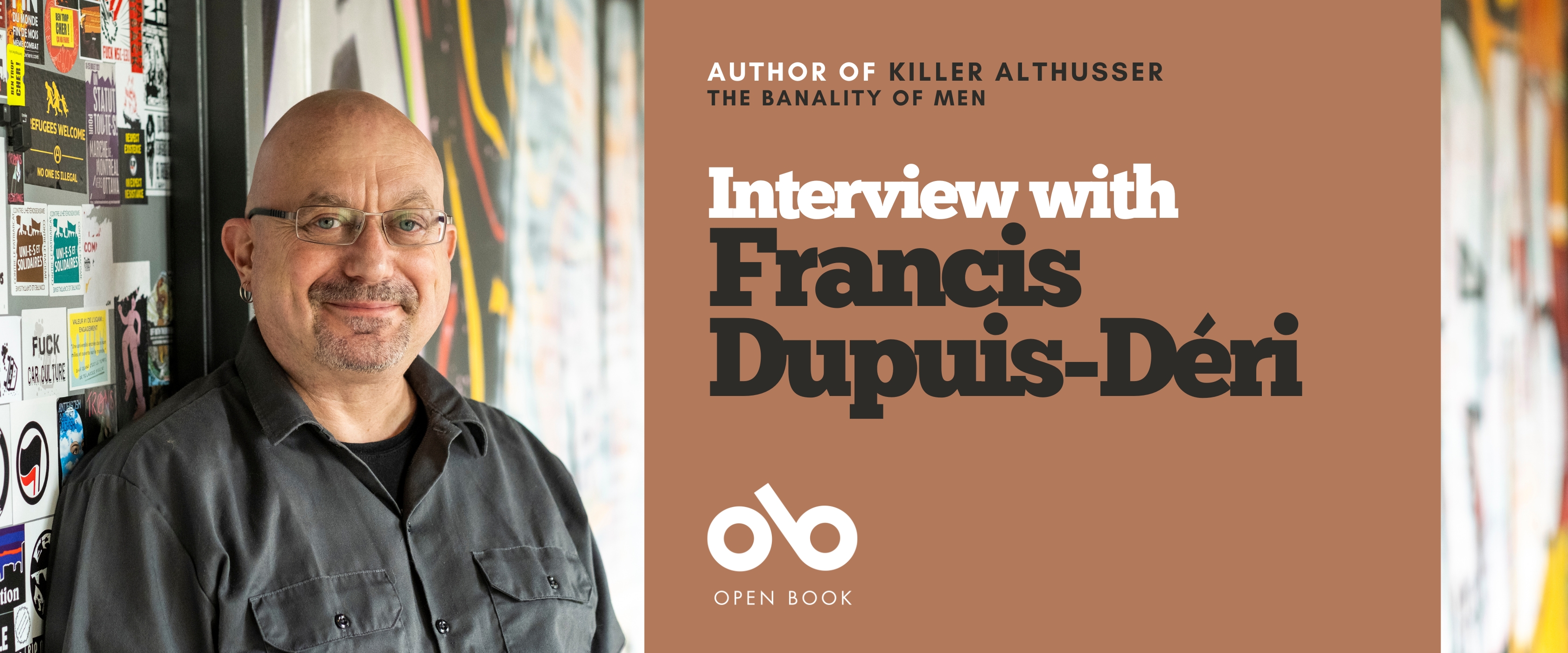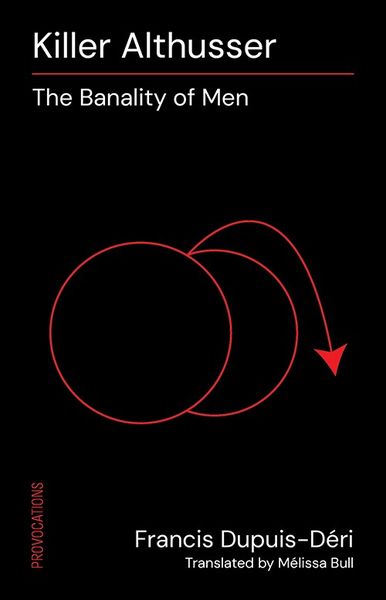Francis Dupuis-Déri Explores an Infamous Crime that Haunts Academia in KILLER ALTHUSSER: THE BANALITY OF MEN
Today we feature a book that explores a shocking true cime story, and one that remains as troublesome and telling some forty years after the act. in November 1980, the world-famous Marxist philosopher Louis Althusser strangled his wife, Hélène Legotien, in their Paris apartment. What do we know of Hélène today? Almost nothing, except for the violent way her life ended, and the fact that her husband’s celebrity ensured his version of events took up all the space. In a devastating twist, Althusser not only killed his wife, but also consigned her memory to silence.
In Killer Althusser: The Banality of Men, political scientist, activist, and prolific writer Francis Dupuis-Déri refuses to let that silence stand. With passion and precision, he revisits the murder and its aftermath, sifting through Althusser’s own writings and the excuses of his allies in France’s intellectual elite. The result is an unflinching indictment of how violence against women is normalized, minimized, and often defended, even in the supposedly enlightened halls of philosophy.
This is a book that doesn’t just tell a dark chapter in intellectual history, it forces us to confront how cultural elites close ranks, how masculine solidarity operates, and how easily a victim can vanish from the story.
Check out this fascinating True Story Nonfiction intreview with the author!
Open Book:
Tell us about your new book and how it came to be. What made you passionate about the subject matter you're exploring?
Francis Dupuis-Déri:
In November 1980, the famous Parisian Marxist philosopher Louis Althusser strangled and killed his partner, Hélène Legotien. What interested me - and especially revolted me - were the media statements by friends, colleagues, renowned intellectuals and members of the Parisian cultural elite who intervened to excuse this murder, on the pretext that Althusser was "mad." Althusser himself wrote a very—too—long autobiography to explain his crime, playing the mental illness card. The media reception of this autobiography was both very laudatory and served as an echo chamber for the mental illness thesis.
OB:
Is there a question that is central to your book? And if so, is it the same question you were thinking about when you started writing or did it change during the writing process?
FDD:
I wanted to understand the discursive mechanisms by which we come to excuse the murder of a woman when the murderer is a famous and admired man.
OB:
What was your research process like for this book? Did you encounter anything unexpected while you were researching?
Your CanLit News
Subscribe to Open Book’s newsletter to get local book events, literary content, writing tips, and more in your inbox
FDD:
I read a lot of often discouraging and revolting texts published on the subject of Althusser, and on feminist sociological studies of male violence, of feminism and of discursive strategies of euphemization and even justification, through the ‘psychologization’ of the murderer. Perhaps my biggest surprise was seeing the extent to which feminist theorists draw inspiration from Althusser's theses without mentioning his murder. I also found feminist historians in France who want to restore visibility to Hélène Légotien, who carried out genuine sociological research on the working class. I present at the end of my book a brief intellectual portrait of Hélène Légotien, and her bibliography, to honor her memory.
I found these apologetic speeches both revolting and fascinating, and I wanted to study them more closely.
OB:
What do you love about writing nonfiction? What are some of the strengths of the genre, in your opinion?
FDD:
I started publishing short stories and two novels in my twenties, but I eventually lost my literary means as I progressed through my doctoral studies in political science at UBC. From then on, I devoted my efforts—and creativity—to writing essays on democracy, social movements, including anarchism, and anti-feminism and the so-called 'crisis of masculinity.' What I really enjoy is tackling topics that are important, controversial, and under-discussed. I also like writing non-fiction because it's a process through which I educate myself; I necessarily learn a lot about my subjects, since I conduct in-depth research. Finally, it's a form that facilitates collective work: I've written several collective works on anti-feminism with sociologist Mélissa Blais, who wrote a book that was also translated into English, "I Hate Feminists" (Fernwood). You also learn a lot when you write with others.
OB:
What do you need in order to write – in terms of space, food, rituals, writing instruments?
FDD:
I definitely need time, and my job as a university professor offers me plenty of it. But I admit that I am so passionate about writing that I always find time to write, I am always writing something, even when I should be doing other tasks. I also need my cat, Lucy, to stop walking and lying on my keyboard, but that is harder to achieve.
OB:
Do you remember the first moment you began to consider writing this book? Was there an inciting incident that kicked off the process for you?
FDD:
It was while reading a text by Judith Butler on Althusser's concept of 'interpellation' that I really wanted to delve into the question of the discourses of protection for this murderer. I was fascinated by the fact that even Judith Butler repeated the thesis of mental illness to explain the murder of Louis Althusser, and that she considered this murder as an anecdotal fact of little importance—she only mentions it in a few words in her text.
OB:
Did you write this book in the order it appears for readers? If not, how did it come together during the writing process?
FDD:
This book began as a 20-page article published in a French feminist academic journal, and then I added a postscript in the same journal after the publication of a new posthumous book by Althusser. It was while discussing with my editor at the feminist publishing house Remue-ménage, where I have already published an essay critical of the anti-feminist discourse of the “crisis of masculinity” and another on pro-feminist men,
their collection of very short essays (the Micro collection) that I told them I might have the material for a project. I sent them the two texts that appeared in the journal, and they asked me to start from there and write the book. My greatest reward for this book is that there were very quickly requests to translate it (into English, German, Catalan, Indonesian, etc.). But above all, I received many testimonies from feminists in France who remembered very well the days and weeks after the murders, or who shared with me their experiences today when they wanted to talk about this murder, for example at university. These testimonies were so touching that I mobilized them to write the afterword found in the English edition of the book.
OB:
What defines a great work of nonfiction, in your opinion? Tell us about one or two books you consider to be truly great books.
FDD:
For me, the greatest non-fiction writer remains Virginia Woolf, largely for her irony.
OB:
What are you working on now?
FDD:
I'm finishing a book that will be published in French in winter 2025, based on a year-long research project on misogynistic, homophobic, and transphobic students in schools. I'm documenting and analyzing how these young people express their reactionary ideas and values by burning pride flags, writing hateful graffiti, insulting their teachers and classmates, intimidating students from the Gay and Straight Alliance committee, and so on. It's equally discouraging and revolting. This is a continuation of research I've been conducting for about 10 years on student political mobilizations in schools, such as the climate strike.
A year ago, I published a comic strip with Emanuelle Dufour, a cartoonist anthropologist, in the form of a fake school textbook that tells the story of true democracy in different peoples, such as the Mohawks and the Wendats, which criticizes the way fake democracy is taught in our schools. It is claimed that this regime was invented in Athens, and only there, and that our parliamentary regime today is also a democracy, which is false. There is a passionate history to student strikes.
__________________________________
Francis Dupuis-Déri teaches political science and feminist studies at Université du Québec à Montréal (UQAM). He is the co-director of the Chantier sur l’antiféminisme, of the Réseau québécois en études féministes (RéQEF), and the author of many books on democracy, social movements, and antifeminism. He lives in Montreal, Quebec.
Mélissa Bull is a writer, editor, and translator based in Montreal. She has published a collection of poetry, Rue, a collection of short stories, The Knockoff Eclipse, and has translated such works as Nelly Arcan’s collection Burqa of Skin and Marie-Sissi Labrèche’s novel Borderline. Her translation of Maxime Raymond Bock’s novel, Morel, was a finalist for the 2024 Governor General’s Award.







